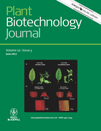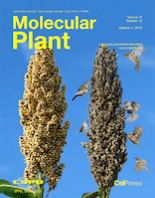
IN VITRO CELLULAR & DEVELOPMENTAL BIOLOGY-PLANT
Scope & Guideline
Innovating Plant Biotechnology for Tomorrow's Solutions
Introduction
Aims and Scopes
- In Vitro Plant Regeneration and Micropropagation:
The journal emphasizes the development of in vitro regeneration protocols for various plant species, including both economically important crops and endangered species. This includes studies on organogenesis, somatic embryogenesis, and micropropagation techniques. - Genetic Transformation and Gene Editing:
A significant focus is placed on genetic transformation methods, particularly using Agrobacterium-mediated techniques and CRISPR/Cas9 genome editing. Research in this area aims to enhance traits such as disease resistance, abiotic stress tolerance, and secondary metabolite production. - Plant Cell Cultures and Secondary Metabolite Production:
The journal features studies on plant cell suspension cultures, callus induction, and the elicitation of secondary metabolites. This includes investigations into the biochemical pathways and regulatory mechanisms that enhance the production of bioactive compounds. - Conservation of Plant Biodiversity:
Research articles often address the conservation of rare and endangered plant species through in vitro techniques. This includes the establishment of cryopreservation protocols and the assessment of genetic fidelity in micropropagated plants. - Influence of Environmental Factors on In Vitro Growth:
The impact of various environmental conditions, such as light quality, temperature, and nutrient composition, on the in vitro growth of plants is frequently discussed, underlining the need for optimized culture conditions.
Trending and Emerging
- CRISPR/Cas9 and Advanced Gene Editing Techniques:
There is an increasing trend in the application of CRISPR/Cas9 technology for precise genome editing in plants. This approach is gaining traction due to its potential to create genetically modified plants with desirable traits more efficiently. - Sustainable Practices in Plant Biotechnology:
Research focused on sustainable practices, including the use of natural elicitors, biostimulants, and environmentally friendly protocols, is on the rise. This reflects a growing awareness of ecological impacts and the importance of sustainable agriculture. - Research on Medicinal Plants and Bioactive Compounds:
There is a notable increase in studies related to the propagation and biochemical analysis of medicinal plants. This trend is driven by the rising demand for natural products and the need for sustainable sources of bioactive compounds. - Integration of Artificial Intelligence and Machine Learning:
The use of AI and machine learning algorithms to optimize in vitro protocols and predict plant responses is emerging as a significant theme, indicating a fusion of biotechnology with computational tools. - Climate Resilience and Stress Tolerance Research:
An increasing number of studies are focusing on enhancing plant resilience to abiotic stresses such as drought, salinity, and extreme temperatures, highlighting the importance of developing crops that can withstand climate change impacts.
Declining or Waning
- Traditional Breeding Techniques:
There appears to be a decreasing emphasis on traditional breeding methods in favor of in vitro and genetic engineering approaches. This shift reflects a growing reliance on modern techniques to address agricultural challenges. - In Vitro Studies on Common Crops:
Research focusing on widely cultivated crops like rice and maize is becoming less prominent, as more studies center around less common or endangered species, indicating a trend towards biodiversity and conservation. - Non-Transformative In Vitro Techniques:
There is a noticeable reduction in studies that explore non-genetic transformation methods such as somatic hybridization and protoplast fusion, as interest pivots towards more efficient genetic transformation technologies.
Similar Journals

PLANT BIOTECHNOLOGY JOURNAL
Catalyzing breakthroughs in agricultural biotechnology.Plant Biotechnology Journal, published by Wiley, is a premier open-access platform dedicated to advancing the field of plant biotechnology. Since its inception in 2003, this journal has played a pivotal role in disseminating high-quality research that enhances our understanding of plant genomics, biochemistry, and molecular biology. With an impressive impact factor and a prominent position in Q1 quartiles across Agronomy, Crop Science, Biotechnology, and Plant Science, it ranks among the top journals globally, reflecting its significant influence in the agricultural and biological sciences. Researchers and professionals can access cutting-edge studies and reviews that facilitate innovation in sustainable crop production and biotechnology applications. The journal's transition to an open access model since 2016 has further amplified its reach, ensuring that vital research is available to a global audience, promoting collaboration and knowledge sharing within the scientific community.

Phytochemistry Letters
Fostering innovation in agronomy and biotechnology.Phytochemistry Letters, an esteemed journal published by ELSEVIER, serves as a significant platform for the dissemination of cutting-edge research in the fields of agronomy, biotechnology, and plant science. With an ISSN of 1874-3900 and an E-ISSN of 1876-7486, this journal is recognized for its rigorous peer-review process and commitment to scientific excellence. Currently ranked in the Q3 quartile in Agronomy and Crop Science and Plant Science, and Q4 in Biochemistry, Phytochemistry Letters encompasses a wide range of topics critical to understanding the biochemical processes in plant systems. Researchers will find valuable insights that bridge the gaps between plant biochemistry and agricultural application, fostering innovation and sustainability. Given its solid position in Scopus rankings, particularly in Plant Science and Agronomy, the journal offers both open access and subscription options, ensuring wider reach and impact of published studies. The journal's ongoing contributions are vital for advancing knowledge and addressing contemporary challenges in phytochemistry, making it an indispensable resource for scholars, professionals, and students alike.

PHYTON-ANNALES REI BOTANICAE
Nurturing the future of ecological research.PHYTON-ANNALES REI BOTANICAE is a distinguished journal dedicated to the fields of plant science and ecology, published by Ferdinand Berger Soehne. With its origins tracing back to 1994, this journal has carved a niche in disseminating vital research findings and innovative studies pertaining to botany and environmental biology, despite its coverage being discontinued in Scopus since 2016. The journal's impact extends across various disciplines, reflected in its rankings within the categories of Agricultural and Biological Sciences and Environmental Science, underscoring its commitment to advancing knowledge in plant sciences. While it is not an open-access journal, its rigorous peer-review process ensures high-quality research that is valuable for researchers, professionals, and students alike. Located in Horn, Austria, PHYTON serves as a pivotal platform for sharing significant contributions to the field, fostering a deeper understanding of plant biology and ecology.

IN VITRO CELLULAR & DEVELOPMENTAL BIOLOGY-ANIMAL
Elevating the Study of In Vitro DynamicsIN VITRO CELLULAR & DEVELOPMENTAL BIOLOGY-ANIMAL, published by SPRINGER, is a pivotal journal in the fields of cell biology and developmental biology, focusing on in vitro studies that enhance our understanding of animal cellular mechanisms and development. With an ISSN of 1071-2690 and an E-ISSN of 1543-706X, this esteemed journal offers a platform for researchers to present their findings and contribute to the body of knowledge necessary for advancements in biological sciences. As a recognized publication, it holds a 2023 category quartile of Q4 in Cell Biology and Developmental Biology, and Q3 in miscellaneous Medicine, reflecting its competitive position yet inviting critical submissions that can span multidisciplinary approaches. Though currently not open access, it serves as an essential resource for professionals, researchers, and students dedicated to unraveling the complexities of cellular processes in an ever-evolving field. The journal has been continuously published since 1986, signifying its long-standing commitment to fostering scientific discourse and innovation.

Plant Gene
Advancing the Frontiers of Plant GeneticsPlant Gene is an esteemed academic journal dedicated to the comprehensive study of plant genetics, genomics, and biotechnology. Published by Elsevier, this journal operates from its base in the Netherlands and has made significant strides since its inception in 2015, with a converged year span extending until 2024. As an integral resource in the field, Plant Gene is categorized in the Q2 quartile for Plant Science and Q3 for Biochemistry, Biotechnology, and Genetics as per the 2023 evaluations, reflecting its growing influence and quality of research. With an impactful presence in Scopus rankings—positioned at #145 in Plant Science—this journal serves as a platform for presenting innovative findings and advancing knowledge in plant science. Researchers, professionals, and students will find access to cutting-edge research articles that not only drive the scientific community forward but also offer invaluable insights into the genetic mechanisms underpinning plant development and resilience. While the journal currently operates under a subscription-based model, it aims to broaden accessibility and foster a diverse range of scholarly discussions in the ever-evolving field of plant genetics.

RUSSIAN JOURNAL OF PLANT PHYSIOLOGY
Connecting Scholars to the Heart of Plant PhysiologyRUSSIAN JOURNAL OF PLANT PHYSIOLOGY, an esteemed publication with ISSN 1021-4437 and E-ISSN 1608-3407, is dedicated to advancing knowledge in the field of plant science. Published by PLEIADES PUBLISHING INC in the United States, this journal serves as a critical platform for researchers, professionals, and students aiming to explore the intricacies of plant physiology, biochemistry, and environmental interactions. With a consistent output from 1996 to 2024, the journal holds a commendable position within the academic community, reflected in its Q3 ranking among 516 journals in the Plant Science category (2023) and a competitive 44th percentile ranking in the Scopus database. Although the journal is not Open Access, it continues to attract a diverse readership of scholars eager to publish groundbreaking research. It stands out as a vital resource for anyone engaged in understanding the physiological processes that underpin plant life, thereby contributing to global agricultural advancements and ecological sustainability.

Propagation of Ornamental Plants
Illuminating Pathways in Plant PropagationPropagation of Ornamental Plants is a distinguished journal published by SEJANI PUBL that focuses on the field of ornamental horticulture, an area critical to both commercial and aesthetic applications in the environment. With an ISSN of 1311-9109, this journal serves as a platform for scholarly articles and research spanning from 2005 to 2021, and resuming in 2023. While its current Category Quartiles place it within the Q4 rankings for Forestry and Plant Science, this journal remains committed to providing valuable insights and research findings related to plant propagation techniques, environmental sustainability, and ornamental plant breeding. Despite being an underrepresented publication within its field, its efforts contribute to the body of knowledge necessary for advancing both academic research and practical applications. For researchers, professionals, and students alike, Propagation of Ornamental Plants stands as an essential resource for advancing the field and fostering innovation in ornamental horticulture.

Molecular Plant
Innovating agricultural practices with cutting-edge research.Molecular Plant, published by CELL PRESS, is a premier journal dedicated to advancing the field of molecular biology and plant science. With an impressive impact factor reflecting its rigorous peer-review process and the high quality of its published research, this journal has achieved a remarkable Q1 ranking in both Molecular Biology and Plant Science categories as of 2023. Its Scopus rankings place it within the top echelons of its field, holding 2nd place in Agricultural and Biological Sciences - Plant Science, showcasing its vital role in disseminating impactful research. The journal covers a broad range of topics, including but not limited to, plant genetics, molecular interactions, and biotechnological advances. Research published in Molecular Plant has the potential to significantly influence agricultural practices and biotechnological applications, making it an essential resource for researchers, professionals, and students eager to stay at the forefront of plant research. Access options for the journal are tailored to accommodate a wide audience, facilitating engagement with cutting-edge findings and breakthroughs. As the field of plant science continues to evolve, Molecular Plant remains integral to fostering innovation and collaboration within the scientific community.

Molecular Horticulture
Exploring the Intersection of Science and SustainabilityMolecular Horticulture is a prestigious journal published by SpringerNature, dedicated to advancing knowledge in the fields of Agronomy, Crop Science, Horticulture, and Molecular Biology. Based in the United Kingdom, this journal, with ISSN 2730-9401, is recognized for its high-quality, peer-reviewed research and has rapidly established itself within the academic community, achieving a remarkable Q1 ranking across its relevant categories as of 2023. With a strong focus on innovative research that explores the intersection of molecular biology and horticultural science, Molecular Horticulture provides valuable insights that are essential for researchers and professionals aiming to enhance crop production and sustainability practices. As part of the Scopus database, the journal ranks impressively within its fields, holding notable positions such as Rank #7 in Horticulture and Rank #42 in Agronomy and Crop Science. While currently published through traditional access models, the journal remains accessible to a wide audience of scientists, educators, and students eager to stay informed on the latest discoveries and trends in plant science.

JOURNAL OF PLANT BIOLOGY
Innovating for a Greener TomorrowJOURNAL OF PLANT BIOLOGY, published by SPRINGER HEIDELBERG, is a leading academic journal dedicated to advancing the field of plant science. With an impressive impact factor signifying its high citation rate and rigorous peer-review process, this journal ranks in the Q1 category within Plant Science, placing it among the top-tier periodicals in the discipline. Established in 1999, it has become an essential resource for researchers, professionals, and students seeking the latest findings and developments in plant biology. The journal fosters a collaborative environment for sharing innovative research, exploring ecological interactions, and understanding plant physiology, thereby contributing significantly to advancements in sustainable agriculture and environmental conservation. Its high Scopus ranking of 102 out of 516 in the category of Agricultural and Biological Sciences further underscores its relevance and impact within the scientific community. For those interested in cutting-edge research, JOURNAL OF PLANT BIOLOGY is a vital source of knowledge, offering insights that are crucial for the future of plant science.